Sunak claims migrants going to Ireland shows Rwanda plan is working, despite no flights taking off

Rishi Sunak has pounced on claims that migrants are heading to Ireland from the UK over fears of being sent to Rwanda as evidence that his deportation plan is working – despite no flights having taken off.
Deputy Irish premier Micheal Martin claimed on Friday there had been a rise in migrants crossing the border from Northern Ireland into the Republic over fears of being sent on a one-way flight to the east African nation under Mr Sunak's flagship policy.
The prime minister responded on Saturday claiming that this was evidence that the deterrent effect of the Rwanda plan was “already having an impact”. This is despite not a single flight having left for Rwanda since the plan was proposed more than two years ago.
Read on AfriPrime Android Web View app ...Click on the link to Amazon Adroid app store....
The legislation ensuring the plan is legally sound, the Safety of Rwanda (Asylum and Immigration) Act, cleared its passage through parliament this week and was signed into law on Thursday. But Mr Sunak acknowledged it could still take 10 to 12 weeks to get flights in the air, in a blow to his earlier target of the spring of this year.
In an interview with Sky News’s Sunday Morning with Trevor Phillips, which will air in full on Sunday, the prime minister was challenged over whether the UK is simply exporting the problem.
Mr Sunak said: “My focus is on the United Kingdom and securing our borders. But what [Mr Martin’s] comment illustrates is a couple of things.
“One, that illegal migration is a global challenge, which is why you’re seeing multiple countries talk about doing third-country partnerships, looking at novel ways to solve this problem, and I believe will follow where the UK has led.
“But what it also shows, I think, is that the deterrent is, according to your comment, already having an impact, because people are worried about coming here and that demonstrates exactly what I’m saying.
“If people come to our country illegally, but know that they won’t be able to stay, they’re much less likely to come, and that’s why the Rwanda scheme is so important.”
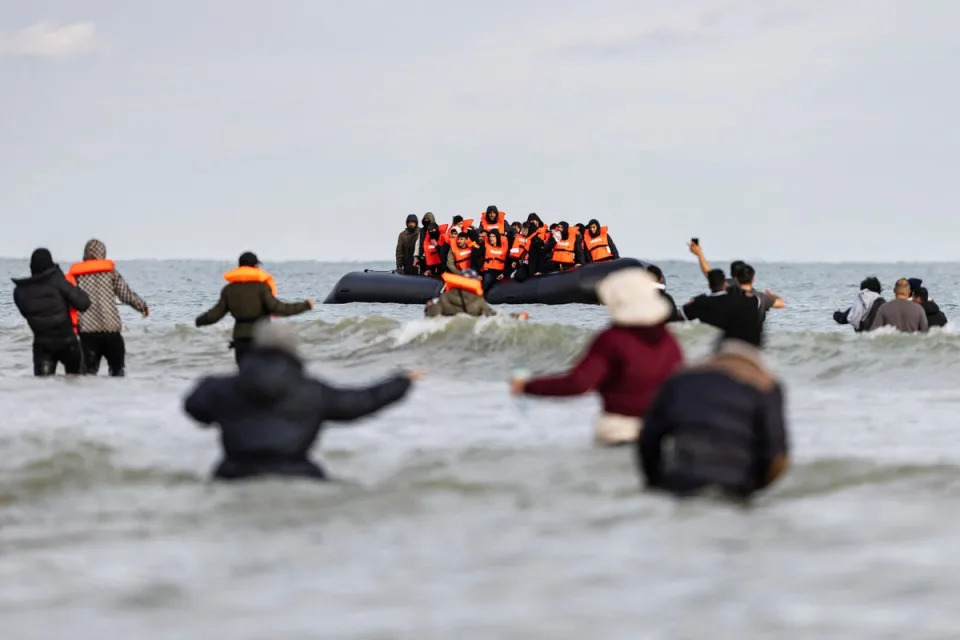
It comes after Mr Martin told the Telegraph the Rwanda policy was already affecting Ireland because people were “fearful” of staying in Britain.
He said asylum seekers were hoping “to get sanctuary here and within the European Union, as opposed to the potential of being deported to Rwanda”.
The border between Northern Ireland, which is part of the UK, and the Republic of Ireland, a European Union member, is the only land border between the UK and the EU since Britain left the bloc.
Ministers plan to send asylum seekers coming to the UK on flights to Rwanda, with the aim of deterring others from crossing the English Channel on small boats.
Downing Street on Friday rebuffed claims the plan was already influencing movements into Ireland, saying it was too early to jump to conclusions on its impact.
A No 10 spokesperson said: “Of course, we will monitor this very closely and we already work very closely, as you would expect, with the Irish government, including on matters relating to asylum.
“But of course, the intention behind the act is to have it serve as a deterrent and that is why we are working to get flights off the ground as swiftly as possible.”
Mr Martin, who also serves as Ireland’s foreign affairs minister, told reporters in Dublin that there was a “clear … increase in numbers” and suggested the Rwanda policy was a “fairly obvious” cause.
Irish ministers suggested earlier this week there had been a rise in the number of migrants crossing the land border between Northern Ireland and the Republic.
Justice minister Helen McEntee told a committee of the Irish parliament that more than 80 per cent of migrants in Ireland had entered from the UK.
The migrants who say the Rwanda bill won’t deter them from crossing the Channel
It has taken James, a 24-year-old refugee from South Sudan, over four years to get to Dunkirk in northern France – where he is hoping to get on a small boat to the UK.
His home country was stricken by a civil war that forced him to give up his place to study engineering at university and flee for his life. As he travelled along one of the most dangerous migration routes in the world, he fixated on his dream of being able to continue his studies in the UK.
This week Rishi Sunak finally passed his flagship Rwanda bill, which he says will deter people like James from coming to Britain. The deaths of five people, including a seven-year-old girl, have brought home yet again how dangerous the Channel crossing can be. But despite this, James is not deterred.
Read on AfriPrime Android Web View app ...Click on the link to Amazon Adroid app store....
Speaking to The Independent from a makeshift aid distribution site near the Dunkirk encampments, he said: “I will go to the UK if I get my chance. I am hoping to go back to school and I dream of living a good life. If you have a dream of doing something, there is a constant pressure to achieve it. I spent 14 years in school; I went to primary school and secondary school and I want to make the most of my education.
“I had a place to study engineering at university, but I had to give it up because of the war and flee. I am frustrated about the Rwanda plan. Rwanda is a very close country to South Sudan. If I wanted to go there I would have gone there much easier, but I know that it will not be a safe country for me. Life is all about the choices you make, where you want to be, and if I wanted to be in Rwanda, I would be there.
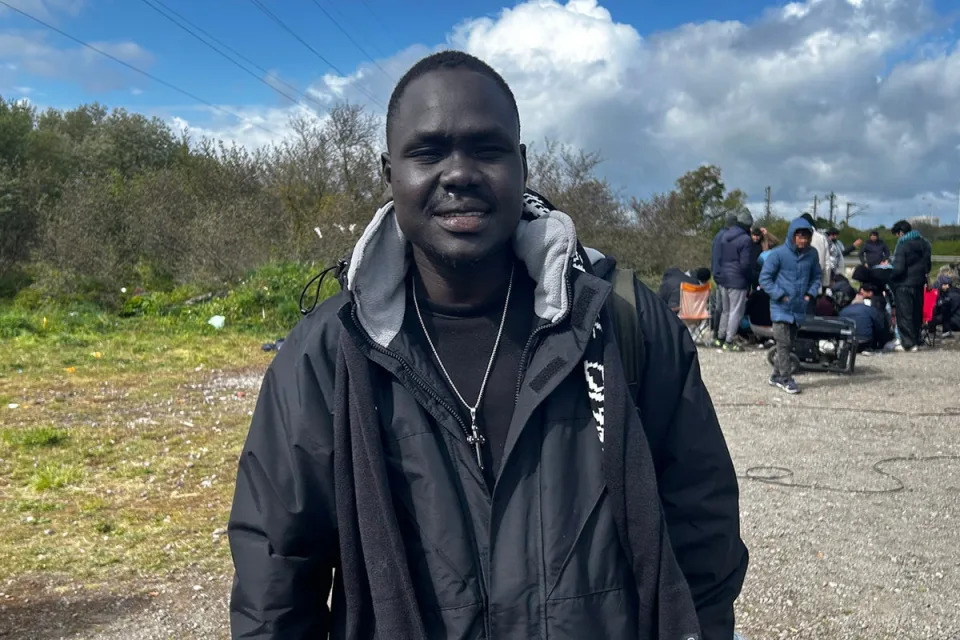
“Thinking about the Rwanda plan puts us under a lot of pressure, but so does the pressure of my dream of achieving something. In this life, you are put on this earth to do good things, to be a good human being, and to leave a legacy behind. I pray that this Rwanda plan does not happen. If I go I know I will not be happy for the rest of my life.”
The risk of the Channel crossing, which has claimed 14 lives already this year, is nothing compared to the risks James has already faced. His worst experience on his journey so far was when a van he was travelling in broke down in the middle of the Libyan desert.
“There were 25 of us including the driver. In the end 20 people died of dehydration. You cannot walk across the desert when that situation happens, you don’t know where to go. You can only stay there and hope that someone will pass on the way. After five days some people arrived and they rescued those of us that were left. I managed to survive,” he said.
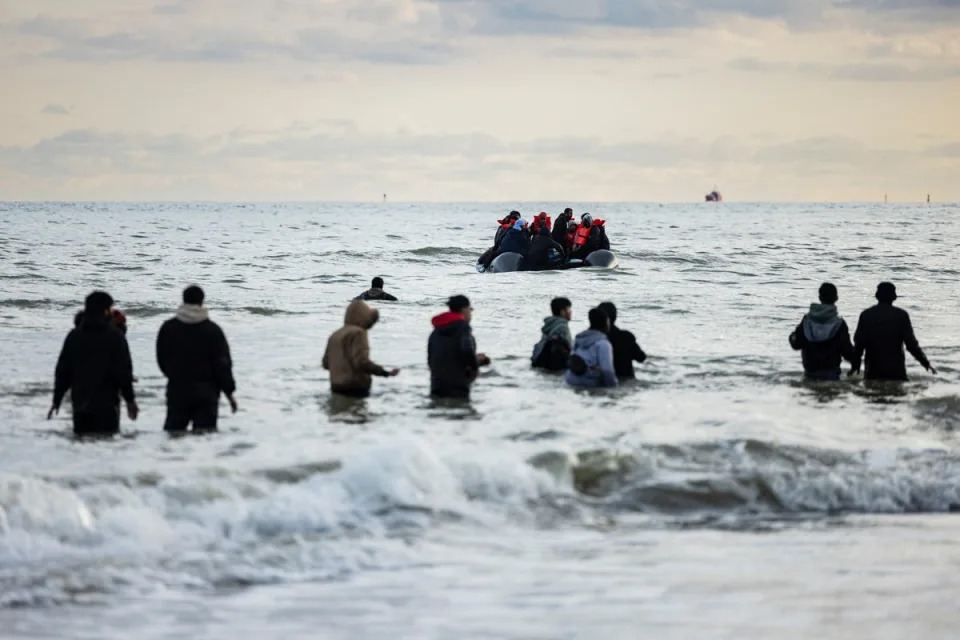
Migrants in the makeshift camps at Dunkirk are under constant pressure from the French police, both where they sleep and when they get to the beaches to attempt the Channel crossing.
Many say that the police aggression shows them that they cannot build a life in France and that they must get to the UK.
Some who The Independent spoke to at an aid distribution site in northern France had spent some years living in Germany or Belgium before having their asylum claims rejected. They say they were given the choice of leaving or being deported back to their home country, and so they chose to try to come to the UK.
‘I have tried to come to the UK legally but there is no way’
Others are doubtful the UK’s plan to send asylum seekers to Rwanda will really happen, such as 24-year-old Ahmad Nadeem Ebadi, who fled Afghanistan with his wife after the Taliban takeover.
The majority of Nadeem’s family are living in the UK after they were evacuated during Operation Pitting, the UK government’s effort to fly people out of Afghanistan before Kabul fell to the Taliban in August 2021.
His father is a dual British citizen, having lived in England after he fled there as a refugee when the Taliban took over Afghanistan in the 1990s. He was called forward to Kabul airport during the evacuation and was able to take some of his children with him, but Nadeem and his wife were not able to get into the airport.
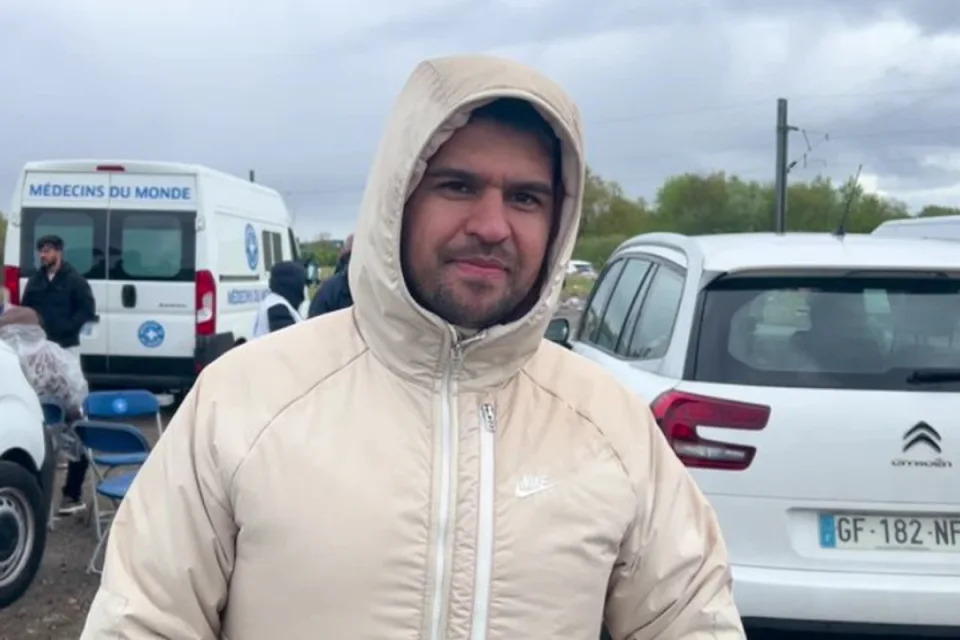
“I didn’t get a chance to go on the plane. I have tried so many ways to come legally but there is no way,” he said.
He has been living in Dunkirk for a month and is hoping his wife will be able to get a room in a local women’s shelter. Reflecting on the threat of being deported to Rwanda if they managed to get to the UK, he said: “I really don’t know if it is true. I really hope to go to the UK. If it costs my life I don’t care about that. We left everything in Afghanistan. The Taliban are in Panjshir and we left everything there.”
He and his wife have already tried to get on a boat across the Channel three times but he does not have any money to pay a people smuggler to guarantee a place on the dinghy. “We have walked seven to eight hours at night to reach the Channel, but the police stop us each time. There are usually around 50-60 people trying to get on the boat. There are maybe six police in two cars and they had a drone camera.
“My wife was beside me as we walked but it was very hard for her, she fell down many times. The situation is very hard for us, I cannot stay like this.”
‘I can understand why UK wants to deport migrants to Rwanda’
Lamsa Kuku, a 17-year-old from South Sudan, said the UK was his “final destination” on a harrowing journey, which included three months in detention in Libya. He understood why Rishi Sunak might want to deport asylum seekers, saying: “I think migrants are so many in the UK that they want to send them back to Rwanda.
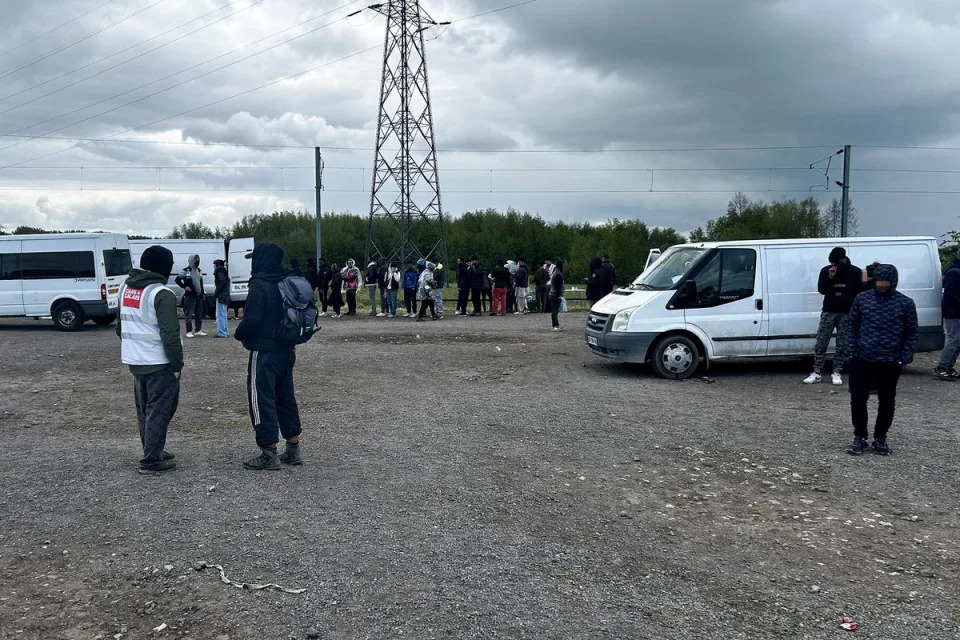
“The UK is a smaller island and France is very big. That’s maybe why they decided they want to deport back the people. Or maybe it is politics. But I know I don’t want to stay here, I want to go there.”
He had left South Sudan as a child refugee in 2020 and had no possessions with him apart from the clothes he was wearing. “We are living under a tree, always there is rain, and always we try to reach the UK. I don’t have any money to pay anyone to help me. I have stayed here one month but I don’t know what will happen then; I’m not going forward and I’m not going backward. I stay in the middle. I have nothing here. I am moving around place to place, as the police move us. I come here [to the distribution site] to get food and eat and then I’m going to another place.”
A committed Christian, he had been telling people about Jesus at the Dunkirk camp, and he had a strong belief that he had come to northern France by God’s will. “He has guided me these four years,” he said, as he contemplated the risk of dying in the Channel.
Read on AfriPrime Android Web View app ...Click on the link to Amazon Adroid app store....
‘We are fleeing war. They should not send us to Rwanda’
Mohammad, 27, who is from neighbouring Sudan, was incredulous as he thought about the possibility that the UK government could send him back to a country so close to the one he had fled from.
“If they send me to Rwanda, it will be a big problem”, he said. “Maybe our view of the UK will be changed. For me I can’t imagine it. Maybe the people who have no reason to leave their countries, they could send them to Rwanda, but not us – people who have fled war.
“If they send me to Rwanda, I will imagine that there are no good people in the world. I escaped from war, I have arrived in Europe, and then they send me back again. I could not believe it.”
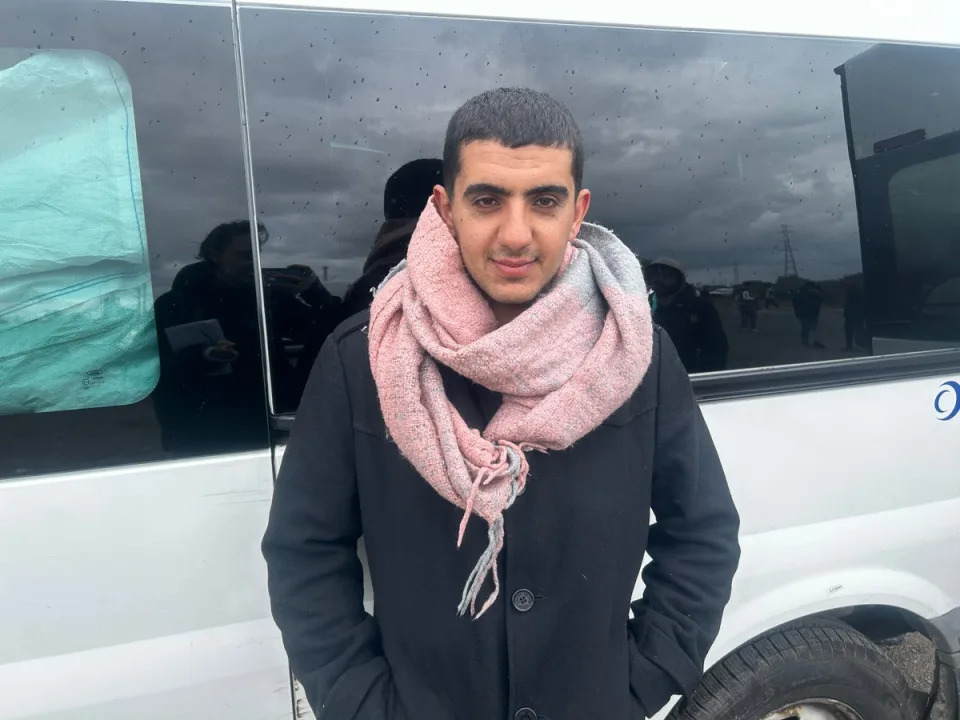
‘I’ll take the chance because Rwanda is better than Iran’
Rahmeen Mohammad, 22, who is from Iran, said he wanted to get to the UK because his life was in danger back home. “I organised a demonstration for freedom and that’s why they know me and why my life is in danger. I came from Turkey to France by lorry and I was given a sleeping tablet, which I took, so I’m not sure how long the journey was.”
When asked if the Rwanda bill would put him off going to the UK, he said: “I have to go because I need a safe place. And I think Rwanda is better than Iran.”
One Afghan refugee, who did not want to give his name, wanted to tell The Independent about the life that had been ripped away from him when the Taliban took over. “I had a good life in my country. I like my country, I did not leave it easily. I have to go to the UK because France is not accepting us.
“I was working for human rights organisations and they became a target for the Taliban. Me and these people around us, we don’t have anywhere else to go. Not everyone here is illiterate. They are good people, who had good lives. We just want to work and have a safe and peaceful life, like anyone would want for themselves.”
Rwanda plan: Irish government wants to send asylum seekers back to UK
The Taoiseach (Irish prime minister) Simon Harris has asked Ireland's justice minister to bring legislation to cabinet to enable asylum seekers to be sent back to the UK.
Helen McEntee has revealed that 80% of recent arrivals to the Republic came from the UK across the Irish border.
Tánaiste (deputy prime minister) Micheál Martin said the UK's Rwanda policy was already impacting Ireland.
Legislation to revive the UK's Rwanda policy became law on Thursday.
It aims to deter people from crossing the English Channel by sending some asylum seekers to the central African country.
No migrants have been sent yet from the UK.

The UK government had hoped for flights to take off by the spring but Prime Minister Rishi Sunak says this should now happen within 10 to 12 weeks.
Read on AfriPrime Android Web View app ...Click on the link to Amazon Adroid app store....
A spokesman for Mr Harris said the taoiseach had asked the Ms McEntee "to bring proposals to Cabinet next week to amend existing law regarding the designation of safe 'third countries' and allowing the return of inadmissible international protection applicants to the UK", Irish broadcaster RTÉ reported on Saturday.
Speaking on RTÉ's Six One News, Ms McEntee said: "There are many reasons why we have seen an increase in migration toward Ireland.
"What's clear in the decision that the UK have taken in choosing Brexit, they have actually seen an increase in people seeking asylum in their country. The way that they deal with that, it's their policy.
"My focus as minister for justice is making sure that we have an effective immigration structure and system.
"That's why I'm introducing fast processing. That's why I'll have emergency legislation at cabinet this week to make sure that we can effectively return people to the UK and that's why I'll be meeting with the Home Secretary [James Cleverly] to raise these issues on Monday."
A spokesman for the Irish Department of Justice told BBC News NI that "the issue of irregular movement within the CTA" - the Common Travel Area between Britain and Ireland - would be discussed at the ministers' meeting.
'Fearful'
Earlier in the week, Ms McEntee told a committee of the Oireachtas (Irish Parliament) there had been a rise in the number of people crossing the land border between Northern Ireland and the Republic, with this now making up 80% of the total number of asylum seekers.
In response to her comments, Mr Martin said the UK government's Rwanda policy meant people were "fearful" of staying in the UK and were crossing the border to the Republic so they would not be sent to Rwanda.
Mr Martin, who also serves as Ireland's foreign minister, has spoken of his opposition to the policy.
A No 10 spokesperson said it was "too early to jump to specific conclusions about the impact of the Act and treaty in terms of migrant behaviour" following Mr Martin's comments.
The Safety of Rwanda Act, which aims to avoid further legal challenges to the policy by declaring Rwanda a safe country, was approved by MPs and peers this week and passed into law on Thursday.
However, the plan could still be held up by court challenges.
Ireland ‘reaping what it has sown’ over Brexit with influx of migrants
Micheál Martin, Ireland's deputy prime minister, blames the Rwanda plan for an increase in asylum seekers -
The influx of migrants crossing into Ireland from the UK is because Dublin is “reaping what it sowed” in the Brexit negotiations, a leading unionist has said.
Micheál Martin, Ireland’s deputy prime minister, has blamed the Rwanda plan for an increase in asylum seekers entering his country from Northern Ireland.
Dublin believes that more than 80 per cent of asylum seekers in Ireland have crossed the open border.
Jim Allister, the leader of the Traditional Unionist Voice party, said it was not the Rwanda plan but Ireland’s insistence on keeping the border open after Brexit that was to blame.
“You reap what you sow. The Republic of Ireland insisted there wouldn’t even be a camera allowed on the international frontier and now they lament the consequences of the open border they demanded,” he told The Telegraph.
“It’s hard to find sympathy for those so driven by their all-Ireland agenda and poking the British over Brexit that they insisted on the very thing now swamping them with immigrants.”
Mr Martin, speaking in Amman, Jordan, on Wednesday, said: “I believe the Rwanda effect is impacting on Ireland.
“I don’t think anyone’s gone to Rwanda yet, but to me it’s reflective of a policy,” he said. “But it is having real impact on Ireland now in terms of people being fearful in the UK – maybe that’s the impact it was designed to have.”
Brexit deal tensions
Tensions over immigration have risen in Ireland amid an increase in migrant numbers and a housing crisis. On Thursday, police arrested six people after officers came under attack by protesters at a site earmarked for asylum seekers in Newtown Mount Kennedy, Co Wicklow.
Mr Allister is a fierce opponent of Rishi Sunak’s Brexit deal for Northern Ireland, which he says puts the region’s place in the UK at risk.
The Windsor Framework kept the land border with the Republic of Ireland open after Brexit but at the price of introducing an Irish Sea border between Britain and Northern Ireland.
Dublin and Brussels insisted on the deal to prevent a post-Brexit hard land border on the island of Ireland, in the negotiations to take the UK out of the EU.

Ireland said the return of border infrastructure would put the peace process at risk and that a Brexit treaty was necessary to protect its place in the EU’s Single Market.
Northern Ireland continues to follow hundreds of EU rules under the agreement, which also gives it lucrative dual access to both the UK and EU markets.
Power-sharing was restored in Northern Ireland after negotiations ended a two-year boycott of Stormont by the DUP over the Irish Sea border.
Hard-line unionists, including the TUV, which has formed an election alliance with Reform UK, fear the deal is a precursor to an attempt to unify Ireland. Sinn Fein has called for a reunification referendum by 2030.
Lord Dodds, the DUP peer, said: “The complaints from Irish politicians ring hollow. At every point in the Brexit drama they never hesitated to advance their own interests at the expense of relations with unionists and the UK. Now in true Dublin style they blame others for the consequences of policies they pursued.
“Dublin has been vociferous in advocating a totally open border and has even castigated UK efforts to introduce new travel visa requirements for non Irish citizens wanting to travel from the republic into the UK through N Ireland,” he added, referring to British plans to require a permit from non-Ireland residents.”
Baroness Hoey said: “The Republic of Ireland is a foreign country. It’s a bit rich for them to be complaining about something when they themselves have been the country that has refused to accept that there is a frontier with the United Kingdom and their independent country.
“British taxpayers are paying for the EU single market to be protected. We’re spending all this money and putting up border posts in our own country to protect their Single market, which of course also ultimately is also affecting trade between GB and Northern Ireland,” The Brexiteer peer, who is from Northern Ireland, said.
She added, “Chickens come home to roost, as they say.”
Ireland and the UK are also part of a Common Travel Area that predates both countries’ EU membership.
On March 22, the Irish High Court said a decision by the justice minister to designate the UK as a “safe country” after Brexit was unlawful. It said she exceeded her powers.
Legislation is in the works to remedy this but in the meantime Ireland cannot use a refugee returns deal with the UK.
Reform ECHR if Rwanda flights blocked, senior Tories warn
James Cleverly, the Home Secretary signing a new treaty with Vincent Biruta, his Rwandan counterpart in Kigali.
The European Convention on Human Rights (ECHR) must be reformed if it is used to block deportation flights to Rwanda, senior Tories on the centrist wing of the party have warned.
Damian Green and Matt Warman, the chairman and leading member of the One Nation caucus, said the treaty must not be used to obstruct Rishi Sunak’s flagship migration plan after it finally became law earlier this week.
Read on AfriPrime Android Web View app ...Click on the link to Amazon Adroid app store....
One Nation MPs have long defended the ECHR against criticisms from the Right of the party and insist the Rwanda scheme cannot breach international law.
However, Mr Green and Mr Warman said the Government must be “ready to take a leading role” in reforming the court if it stepped in to scupper removal flights.
The most senior judge at the European Court of Human Rights, which oversees the convention, has previously warned Mr Sunak’s scheme could fall foul of the convention.
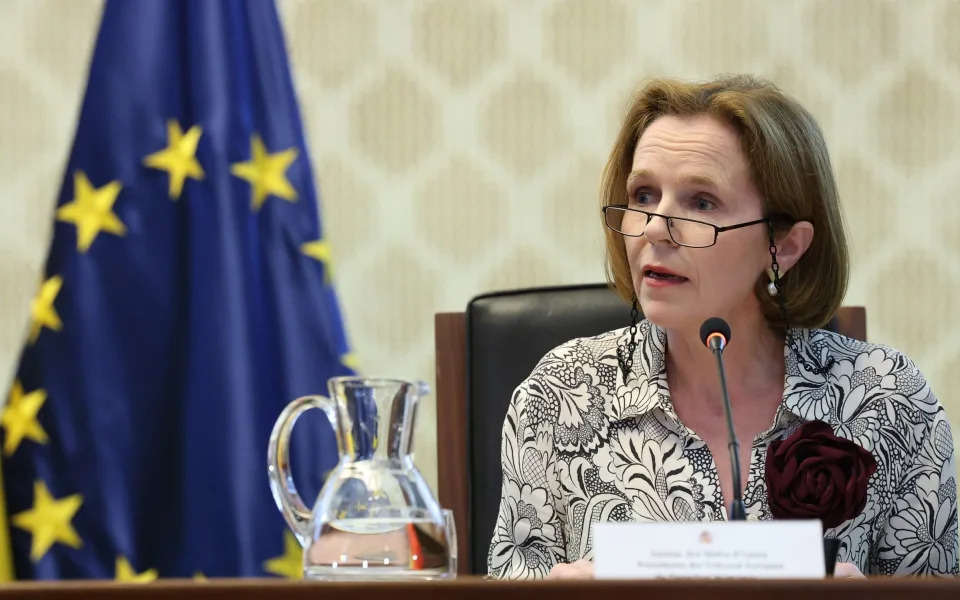
Writing for The Telegraph, the former ministers said: “Despite empty noise from the Left, Parliament has delivered on its part of the bargain and passed the Bill.
“Now it is time for the Home Office to step up and do its part too, ensuring officials do all they can to get flights off the ground and deliver on the British people’s priorities.
“This should not be prevented by international courts, and if the ECHR chooses to intervene, then the Conservative Government must be ready to take a leading role in reforming and improving the court to ensure it is fit for purpose.”
At a press conference this week, Mr Sunak revealed plans to get the first flights off to Rwanda in the next 10 to 12 weeks after admitting parliamentary delays meant he would miss a previous spring deadline.
Mr Sunak said his plan to send asylum seekers to Rwanda was “more important” than “membership of any foreign court”.
Leaving the convention has become a key demand of senior figures on the Tory Right who believe it is the only way the Government can stop illegal Channel crossings.
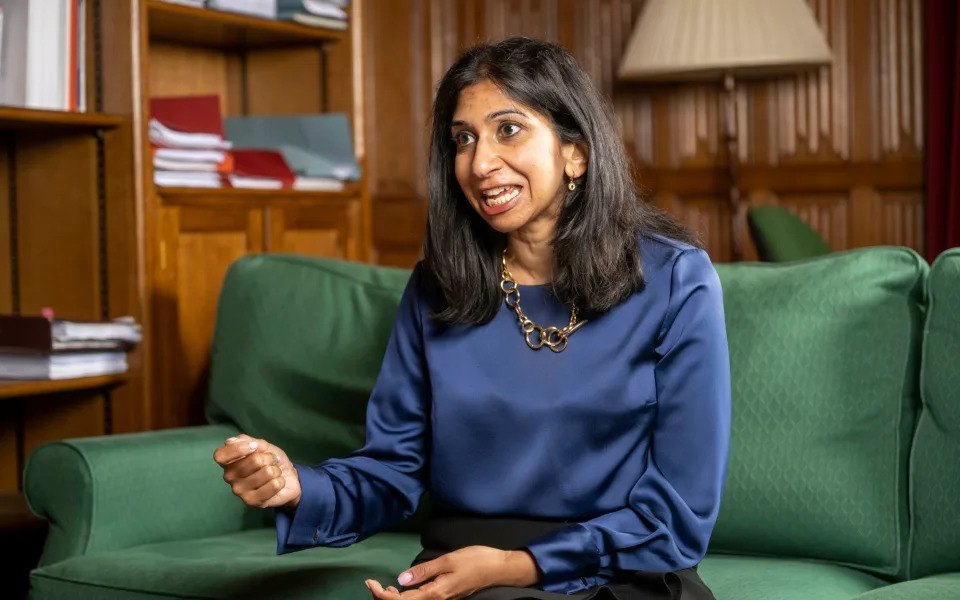
Suella Braverman, the former home secretary, believes Britain should quit the ECHR with immediate effect, while Robert Jenrick, who was Mrs Braverman’s immigration minister, has called on the Conservatives to fight the next general election on the issue.
Mr Green and Mr Warman also urged colleagues to fall in line behind Mr Sunak and focus solely on defeating Sir Keir Starmer and Labour at the next national polls.
The Tories are currently predicted to lose as many as half of their councillors contesting in Thursday’s local elections. A poor performance is likely to trigger fresh speculation about Mr Sunak’s future in Downing Street as his party trails Labour by around 20 points in the polls.
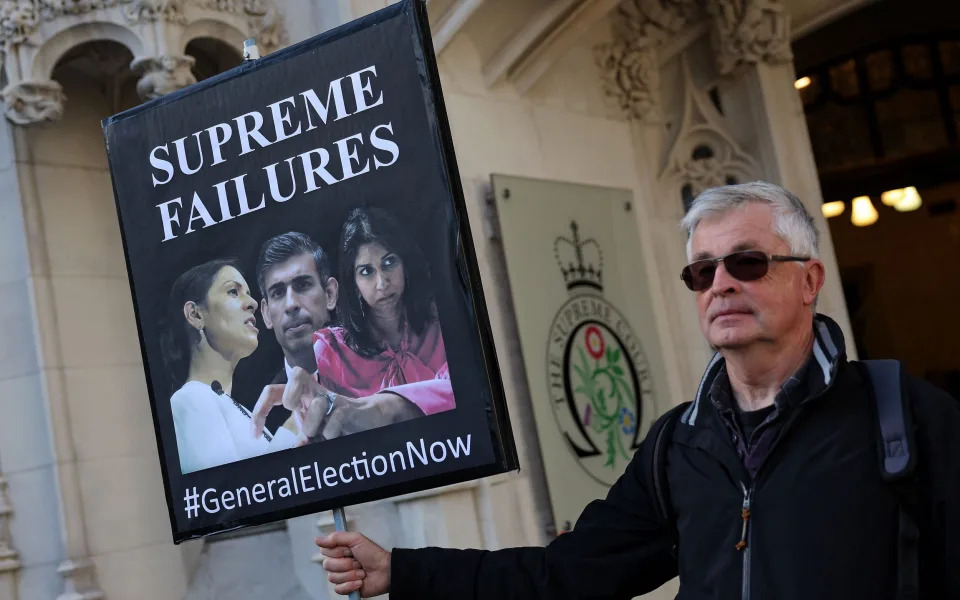
In an appeal for cool heads regardless of the result, Mr Green and Mr Warman said voters on the doorstep too often asked “what are you lot playing at?” and had a “universal request to unite and get on with governing”.
“Without that, no messages will cut through,” they wrote. “We have proven that by working together as a party, sticking to the plan and putting more money in ordinary people’s pockets, that we are able to keep the UK on the path to prosperity and security.
“We mustn’t forget that the only way the Conservatives can continue to deliver for voters is by uniting behind a single cause – stopping Keir Starmer and his band of tax and spenders from entering No 10 after the general election.”
Critics of Mr Sunak have previously singled out the aftermath of the May 2 local elections as a potential inflection point as Right-wing MPs consider a plot to oust him, with Penny Mordaunt, the Leader of the Commons, emerging as their preferred candidate.
Only two Tory backbenchers – Sir Simon Clarke and Dame Andrea Jenkyns – have publicly demanded his resignation to date, while even many vocal opponents of Mr Sunak have privately acknowledged the public is likely to have no appetite for a fourth Conservative prime minister in the space of a single parliament.
Unity is the only way forward for the Conservatives
They’re the words every politician wants to hear when they knock on a voter’s door: “I know who you are”.
They might – and often do – mean that hard work has been noticed. Out campaigning recently, though, they’re now frequently followed by one common question: “What are you lot playing at?”
And for all the fact that Conservatives are cutting taxes, increasing defence spending, building hospitals and increasing access to GPs, there’s a universal request – unite and get on with governing. Without that, no messages will cut through.
This week, Parliament passed landmark legislation to get flights off the ground to Rwanda. Despite the doubts of the Left-wing armchair politicians, the Prime Minister walked across what they called an impossible tightrope and passed the toughest legislation on illegal immigration in history.
Unlike Labour, we have a plan to tackle illegal immigration and have proven we can deliver. While the Prime Minister and Home Secretary are focused on getting asylum seekers on flights, all we see from Labour is empty rhetoric.
You just need to look at Angela Rayner’s comments during this week’s Prime Minister’s Questions and her hapless effort to couch her own political mistakes into comments about the Prime Minister’s appearance. The idea that it’s time for a change is fundamentally undermined by the prospect of this feeble Labour Party in power.
One Nation Conservatives supported this tough action because we want to help unite the Party behind practical policies and because protecting our borders and stopping the boats is the right thing to do.
Now, it is time for the Home Office to step up and play its part, ensuring officials do all they can to get flights off the ground and deliver on the British people’s priorities. This should not be prevented by international courts, and if the ECHR chooses to intervene, then the Conservative Government must be ready to take a leading role in reforming and improving the court to ensure it is fit for purpose.
Fortunately, the Home Secretary is – just like our party – a man of action who we believe will act swiftly to ensure nothing holds us back from putting an effective deterrent in place and stopping the boats.
Immigration, though, is not the only issue. In order for us to address challenges on both global and domestic fronts, we need to foster a dynamic and prosperous economy.
Thanks to the Conservatives’ stewardship over the last decade, investment is up, unemployment is down, and we’re providing tax cuts to put more money back into the pockets of ordinary people. These policies, just as much and often even more so than immigration, are vital to voters.
All too often we forget the positive change the Conservatives have delivered over the past fourteen years. Alongside education standards rising and crime falling, this includes the significant steps we’ve taken in the last three years to help families tackle the cost of living crisis, driven by Russia’s invasion of Ukraine and the soaring inflation that followed.
And as voters head to polling stations on Thursday, we all have a duty to remind them that we kept the economy afloat during a global pandemic, supported families during the cost of living crisis, and redoubled our commitment to keeping Britain safe and secure in the face of new dangers across the world.
For years, these decisive steps have empowered us to act on another fundamental Conservative principle: the protection of democracy and freedom worldwide. The world is currently facing its most dangerous period since the Cold War, and it is imperative to ensure the safety of the UK’s population, and those of western allies.
That’s why the Prime Minister’s announcement this week to increase defence spending to 2.5 per cent of GDP by 2030 is welcome and reinforces our ongoing commitment to acting as a global leader alongside our crucial NATO allies.
We have proven that by working together as a Party, sticking to the plan and putting more money in ordinary people’s pockets, we are able to keep the UK on the path to prosperity and security.
We mustn’t forget that the only way the Conservatives can continue to deliver for voters is by uniting behind a single cause – stopping Keir Starmer and his band of tax and spenders from entering No 10 after the general election.
- Questions and Answers
- Opinion
- Story/Motivational/Inspiring
- Technology
- Art
- Causes
- Crafts
- Dance
- Drinks
- Film/Movie
- Fitness
- Food
- Games
- Gardening
- Health
- Home
- Literature
- Music
- Networking
- Other
- Party
- Religion
- Shopping
- Sports
- Theater
- Wellness
- News
- Culture
- War machines and policy





